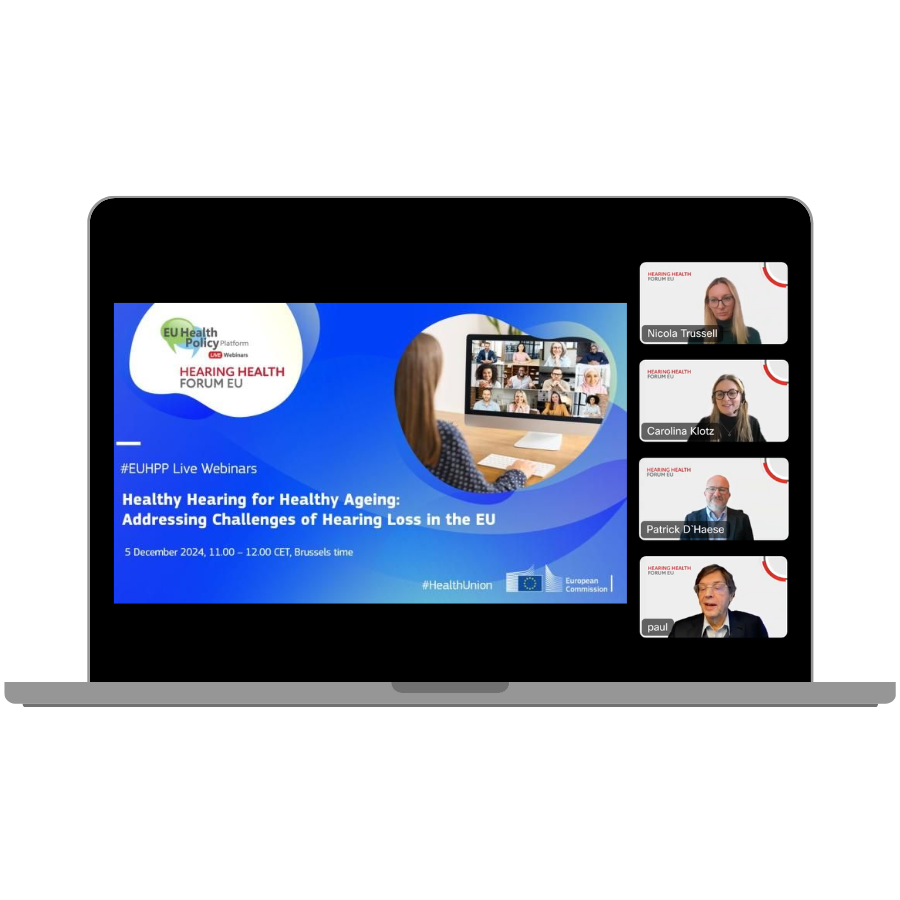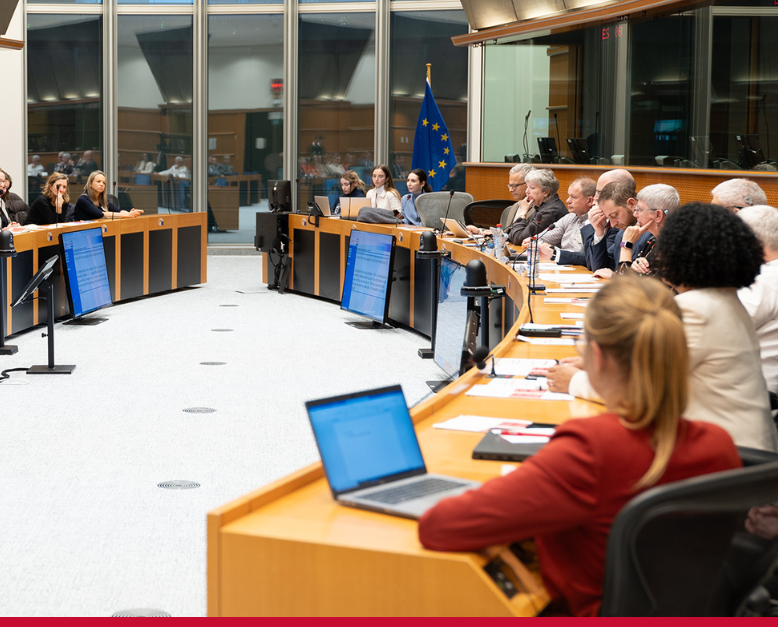Events
We'll share hearing loss event information including our upcoming round-tables, forums, and European Parliament events plus you'll get the latest hearing loss news here.
Latest Hearing Loss News
November 2023
Active Ageing through Healthy Hearing: European Parliament Event
The Hearing Health Forum EU organized a policy roundtable discussion bringing together influential stakeholders and experts from across Europe to discuss active ageing and the importance of hearing screening in the EU. Co-hosted by MEP Alex Agius-Saliba, together with MEP Radka Maxova, the roundtable addressed vital issues surrounding adult hearing health such as hearing loss, associated comorbidities, screening, diagnosis, treatment, and the social and economic impacts of hearing health.
The core recommendations from the event include:
- Creating a European Hearing Health Strategy
- Establishing standardized adult hearing screening tests in all Member States
- Adopting a European Parliament Resolution to address the subject of hearing loss
- Integrating hearing loss into active ageing policies
- Raising the issue of hearing health thorugh mental health initiatives
- Creating a comprehensive health policy and prevention-oriented approach to adress the needs of an ageing population
- Creating a European Declaration on Older Persons
- Organizing a European Year of Older Persons
Speakers present:
- Moderator: Dr. Patrick D’Haese, Director of Public Affairs, MED-EL
- MEP Alex Agius-Saliba (S&D, MT), European Parliament
- MEP Radka Maxova (S&D, CZ), European Parliament
- Dr. Andrew Sciberras, President of Maltese Audiologists Association
- Gonçalo Lobo Xavier, Vice-President at European Economic and Social Committee
- Stefan Schreck, Advisor for stakeholder relations, DG SANTE, European Commission
- Welcome and introduction by Dr. Patrick D’Haese, MED-EL
Dr. Patrick D’Haese gave a warm welcome to the attendees and outlined the programme of the event.
- Dr. Patrick D’Haese introduced the policy roundtable co-hosted by MEP Alex-Agius Saliba and MEP Radka Maxova. The speakers would address the EU’s ageing population, the need for EU adult hearing screening programs and put forward policy recommendations for a European Hearing Health Strategy.
- Dr. Patrick D’Haese announced the 360o virtual reality experience, where attendees would be able to experience differing levels of hearing loss in and around the European Parliament.
2. Presentation by Dr. Andrew Sciberras, Maltese Audiologists Association
Dr. Andrew Sciberras shared the key findings of the collaborative adult hearing screening pilot project in Malta and the burden of hearing loss in Europe.
- Dr. Andrew Sciberras introduced his background. He has been practicing audiology for 24 years, working for the government and the public health sector and since 2015 in the private sector. He mostly has experience in cochlear implant programs and screening programs for children.
Using Kochkin (2011) methodology, Dr. Andrew Sciberras estimated that in 2014, 1.4% of Maltese population had hearing loss. He observed that over half of the population living with hearing loss were people over 60 years of age. He also observed a lower patient turnout to his medical office despite the prevalent hearing loss within the older community. Possible reasons are lack of education and awareness, no official screening programs, and complicated bureaucratic referral system.
- Following these initial study results, Dr. Andrew Sciberras called for standardized adult hearing screening programs to improve the quality of life, cognitive function, social life and general and mental health. Hearing loss has multiple comorbidities such as dementia, stress, anxiety, depression, loneliness, diabetes, and heart problems. By addressing the hearing loss early on, there is a decrease in all comorbidities. In his opinion, the screening programs should start at the age of 40 years instead of 50, as suggested by the WHO’s World Report on Hearing.[1] Most importantly, screenings should be free of charge and not a part of advertising, to increase the likelihood of people seeking medical attention and to increase the promotion of hearing health.
- To support this cause, Dr. Andrew Sciberras together with MEP Alex Agius-Saliba, the Ministry of Inclusion and Quality of Life, and the Maltese Association of Audiologists, started the free adult hearing screening pilot project. They tested 700 people, 597 of them had documented results due to issues in recording the data. From that number, 264 people (44%) had untreated disabling hearing loss. The highest number of participants were in the 60-70 age group.
- To tackle untreated hearing loss, Dr. Andrew Sciberras put forward four recommendations:
- Implement a basic and fast standardized screening test with good sensitivity, specificity, and guidelines, done by screeners, with distortion product otoacoustic emissions, automated audiometry, or full audiometry.
- Develop a European Hearing Health Strategy in collaboration with EU countries.
- Establish a good referral pathway to local public audiology centres that can fully test within a reasonable timeframe.
- For governments to create a reasonable timeframe for management of hearing loss as well as reaching out to people living with untreated hearing loss.
- Dr. Andrew Sciberras added that before introducing the screening, we need to address the stigma of using hearing aids, lack of information and accessibility to services, lack of professionals in the field of audiology and the fragmentation of financial aid across the EU.
3. Presentation by Gonçalo Lobo Xavier, European Economic and Social Committee
Gonçalo Lobo Xavier presented the impact of an ageing population on economy and society, demographic changes in the EU and the ways to further boost policies for the inclusion of elderly in society.
- Gonçalo Lobo Xavier introduced his background. He described his personal experience in hearing loss, sharing how difficult it is to establish communication with persons with hearing loss. He then introduced the work of the European Economic and Social Committee (EESC), emphasizing its representation in civil society, including employers, workers, and different NGOs. He wishes to conduct auditory research projects and to collaborate with partners in the auditory field with the aim of providing solutions to shared challenges.
- The ageing society of Europe is not a problem but a challenge. By 2050, there will be 1 in 6 people over 65 years of age in the EU, double the current figure. The cost of long-term care is set to increase by 2.1% of GDP. Therefore, a strategy is needed to combine quality of life with life expectancy, plan investments, and to lessen the negative trends in employment and productivity. He suggested creating different retirement options and helping older people stay socially included and employed.
- Gonçalo Lobo Xavier called for Member States to draft and implement a European Declaration on Older People to reflect the commitment to developing a European Strategy on Older Persons as well as for the EU Commission to organize a European Year of Older Persons to ensure their full participation in society, employment, and the economy. Older persons contribute to society with their knowledge, skills and talents which should not remain underutilized and overlooked. Only with a comprehensive strategy can there be real impact and change.
4. Presentation by MEP Alex Agius-Saliba (S&D, MT)
MEP Alex Agius-Saliba provided a presentation on hearing loss and health, and the role of the European Parliament.
- Without an EU Strategy put in place and with many issues on the subject of hearing loss, MEP Alex Agius-Saliba stated one of his priorities is promoting hearing health. The MEP called for raising awareness within and across Member States, reducing stigma in using hearing devices such as cochlear implants as a treatment option, and ensuring more visibility, coordination, funding, research, and knowledge.
- In his continuous efforts, MEP Alex Agius-Saliba is pushing forward for a resolution in the European Parliament to address the subject of hearing loss. Not treating hearing loss is costing the EU €185 billion yearly with additional pressure on the healthcare systems due to multiple linked comorbidities.
- Since the Commission is currently starting the consultation on a mental health policy, MEP Alex Agius-Saliba stated this is a window of opportunity to raise the issue of hearing health. In his opinion, stakeholders play a crucial role when it comes to establishing hearing health as an important pillar of the European mental health strategy.
5. Q&A session
Following the presentations, Dr. Patrick D’Haese moderated a short Q&A session.
- Dr. Stefan Zimmer, representing the European Hearing Instrument Manufacturers Association, asked about the cost and financing of pilot adult hearing screening projects in Malta.
- In response, Dr. Andrew Sciberras stated that the costs were covered by MEP Alex Agius-Saliba and the Ministry of Inclusion and Quality of Life, and he provided services and audiometers. He emphasized that the project had minimal expenses, adding up to around €1,500, but with regular full-time scale, there needs to be more resources and finance. The World Report on Hearing states that for every dollar invested, there is a $16 return.
- Gonçalo Lobo Xavier added that adult hearing screenings should not be perceived as a cost but as an investment. The EU can create a policy on data systems with statistics on costs and savings in order save money in public services.
- Professor Uwe Baumann, representing the German Society for Audiology (DGA HNO), asked about the presence of registry in the Maltase pilot hearing screening project that was accumulating findings.
- In response, Dr. Andrew Sciberras stated there was such a registry. During screening, every audiologist was registering data on a cloud. The data accumulated was age, noise working conditions, wax, and ear problems.
- Ms. Latifa Aït-Baala, Deputy of the Brussels Parliament, asked if there is an EU country that can serve as a role model in the issue of hearing health.
- In response, MEP Alex Agius-Saliba stated he does not believe there are Member States that are conducting general hearing screenings. The hearing screening project in Malta was the first of its kind. This is why we need to advocate for good practices and examples.
6. Presentation by Stefan Schreck, Advisor for Stakeholder Relations, European Commission
Stefan Schreck provided an overview of the European Commission’s actions and screening policies emphasizing previous and future efforts.
- Stefan Schreck informed there is a system in place to identify and share best practices in the EU health area. The European Commission has created a portal where anybody can submit good practices which can be awarded as a best practice and ultimately financed under EU4Health Program to help Member States with implementation. This can help in promoting hearing health practices.
- Stefan Schreck advised joining the EU Commission’s new stakeholder group concerning mental health on DG SANTE’s Health Policy Platform. Stakeholders can share opinions, collaborate, and produce position papers for the Commission, all of which are helpful to promote hearing health in the realm of mental health.
- Stefan Schreck mentioned the Commission’s joint research center launch of a pan-European data collection effort on loneliness to provide stronger knowledge of coping and prevention. Hearing health is an important element in an EU ageing society; therefore, there must be a recognition of the needs of older persons and adapt to the challenges.
- Stefan Schreck mentioned the work of the Commission in supporting healthy and active ageing under the Healthier Together EU Non-Communicable Disease (NCD) Initiative.
- Under the initiative, they are promoting collaborative action between EU countries in public health issues relevant for ageing population such as mental health and neurological disorders.
- The guidance documents support public health interventions by addressing hearing impairment in preventative strategies for dementia and by implementing newborn hearing screening programs for the early detection of hearing loss.
- Stefan Schreck mentioned the work of the Commission in supporting mental health with multiple initiatives and flagships, fundings and actions put in place.
- Stefan Schreck stated there are Research and Innovation projects on hearing being funded under Horizon Europe. He revealed the Commission is working towards a ready hear project, which will support the development of a new generation of diagnostic and treatment devices for hearing loss.
- In his opinion, to address the needs of an ageing population we must support and nurture the health and wellbeing of all generations equally and without discrimination. To do so, a comprehensive health policy and prevention-oriented approach should be put in place. Such an approach should go beyond public health and include other key policy areas, like employment, education, digitalization, and many more.
7. Presentation by MEP Radka Maxova (S&D, CZ)
MEP Radka Maxova provided insights of challenges of EU’s ageing population and the importance of active ageing as well as explained how hearing health makes a key component.
- MEP Radka Maxova introduced her background. Her work focuses on vulnerable groups, such as elderly, people with disabilities, minorities, women, and children. She advocates for the exchange of best practices for active ageing and lifelong learning. She emphasized the importance of modernizing learning tools for elderly, especially those with vision and hearing impairments.
- MEP Radka Maxova emphasized the impact of ageing on hearing loss. As people age, the likelihood of hearing loss increases. Hearing loss is a hidden barrier to leading a fulfilling life because it causes difficulty with communication, frustration, and low self-esteem. In 2021, the World Health Organization recommended systematic hearing screening, but only 10% of the 57 million Europeans with disabling hearing loss receive necessary treatment.
- MEP Radka Maxova explained the link between hearing health and healthy ageing. Active ageing extends healthy life expectancy and quality of life for all people. People affected by hearing loss experience comorbidities and have a decreased quality of life, with social isolation, cognitive decline, cardiovascular diseases, diabetes, Alzheimer’s, and many more. For example, untreated hearing loss accounts for 8% of dementia cases.
- MEP Radka Maxova stated healthy active ageing is a priority. The EU has contributed to this cause with past initiatives such as the European Innovation Partnership in active and healthy ageing, The European Pillar of Social Rights, and the EP Resolution on Ageing Policies 2020 that served as catalysts facilitating participation of all individuals in society. Even though some Member States are developing active ageing policies, it is crucial to integrate hearing loss directly into these policies. At the EU level, the European Hearing Health Strategy can ensure all individuals with hearing loss actively participate in society, enhancing their overall quality of life.
8. Summary and Close
Dr. Patrick D’Haese closed the policy roundtable with conclusions and invites attendees to the reception and virtual reality experience.
- Dr. Patrick D’Haese concluded there is a start of a different set of efforts within Europe and within national Member States, focusing on healthy ageing and hearing loss. The pilot project in Malta can serve as an example of good practice. It would be best to have screening free of charge and embedded in the healthcare system through standardized tests, with a good referral pathway, so people receive hearing care and treatment in a timely manner.
- Dr. Patrick D’Haese concluded with defining hearing loss as a societal problem and a key component in the ageing process. He called for a resolution on hearing loss and further action from the European Commission. There is a clear window of opportunity to voice hearing loss as an important pillar in the mental health strategy through current mental health consultations. Hearing loss is invisible, but together we can make a difference and bring it higher on the political agenda with a clear aim of creating a strategic approach to hearing health.
October 2023
Upcoming Event on the Importance of hearing Screening Policies
The Hearing Health Forum EU invites you to its next event: “Active Ageing Through Health Hearing: The Importance of Hearing Screening in the EU”.
With rising living standards and advances in medicine, Europeans are living longer than ever before. As Europe faces an unprecedented demographic shift, age-related conditions are becoming more prevalent, impacting both individuals and societies. One of the major health challenges increasingly facing Europe’s ageing population is hearing loss.
By 2050, it is projected that one in four Europeans will be concerned by hearing loss, more than double the current number. Considering that two out of three adults in Europe do not currently receive the necessary treatment for the condition, this upward trend must be addressed.
For affected adults, the issue goes beyond hearing impairment, often resulting in conditions such as mental ill health or dementia, the number one comorbidity of hearing loss. Yearly, untreated hearing loss costs the EU 213 billion Euros, impacting its healthcare system and economy. Close collaboration at EU and Member State level is necessary to address these challenges.
So, what can be done by the EU to increase access to ear and hearing care, and to allow older adults to actively age?
This is the question The Hearing Health Forum EU will be putting forward to policymakers during its next event: “Active Ageing through Healthy Hearing: The Importance of Hearing Screening in the EU”, taking place at the European Parliament in Brussels on November 29, 2023.
By bringing together experts in policy fields related to hearing loss and active ageing, this event aims to provide concrete and actionable responses to improve the life of older adults, highlighting the pressing need for better hearing screening policies at both EU and national levels.
This hybrid policy roundtable on hearing loss and the importance of EU screening programmes will delve into the consequences of untreated hearing loss and explore concrete policy solutions under the moderation of Dr. Patrick D’Haese. Speakers will include MEP Alex Agius-Saliba and MEP Radka Maxová, Dr. Andrew Sciberras (Maltese Audiologists Association), Gonçalo Lobo Xavier (European Economic and Social Committee), and Stefan Schreck (DG SANTE, European Commission).
Following the roundtable, Members of Parliament and visitors will have the opportunity to engage in an immersive 360° Virtual Reality experience, allowing them to gain a deeper understanding of life with untreated hearing loss. Join us to discuss the crucial role played by policy in alleviating the challenges associated with untreated hearing loss, and in promoting active and healthy ageing.
Wednesday 29 November, 14:30 – 18:30, European Parliament, Brussels
Register to attend in-person or online 👉 Event registration form
Watch the event trailer: MEDEL 360 - Trailer - YouTube
February 2023
New Postion Paper on Hearing Loss and Cognition
The Hearing Health Forum EU has produced a new position paper on hearing loss and congition.
In Europe, one-third of people over 60 years are living with disabling hearing loss. By 2050, the global number of people with hearing loss will double. The association between ageing and hearing loss is evident. Therefore, national hearing screening programmes and treatment options are proven to help avoid or minimize comorbidities, social isolation, and financial costs in Europe.
The paper includes the following content:
- hearing loss and it's comorbidities
- the prevalence and evidence of hearing loss and dementia
- modifiable risk factors of dementia
- hearing loss inverventions
- cost effectiveness of cochlear implants
The paper can be used by policymakers to set national policy and to prioritise ear and hearing health on the European agenda. You can find read the paper here in our resource section.
November 2022
EHMA Conference 2022: Session about "Hearing Loss in the Ageing Population"
The 27th Annual Conference of the European Health Management Association (EHMA) took place in June 2022 and explored challenges and solutions to creating sustainable health systems and ways health managers can lead towards them.
The Hearing Health Forum EU held a session on “Hearing Loss in the Ageing Population: Exploring Beyond the Obvious”, which was opened with a statement by our chair MEP Alex Agius Saliba. He mentioned that hearing loss is a pressing issue that is being undertreated and although hearing screenings are cost-effective, they are not promoted as much as screenings for other diseases. MEP Saliba stressed the need for more research, advocacy, and increased access to everyone in need.
Prof. Dr. Paul Van de Heyning emphasises in his presentation that hearing loss is an invisible disorder and that people affected are more likely to experience social isolation or suffer from dementia. Untreated hearing loss amounts to €185 billion to the EU in terms of lost productivity value and quality of life.
Dr. Patrick D’Haese highlights that access to appropriate aid is not available to everyone. Dr. Axel Kaehne refers to the need for healthcare managers to take action to increase access to ear and hearing care. Furthermore, he points out the necessity to consider the patient’s perspective and why they do not seek help.
Take-Home Messages:
- Hearing loss is preventable, and ear and hearing care can reverse its negative effects.
- Health literacy, hearing promotion and prevention – such as wide-spread population screenings – can increase access to care, prevent hearing disorders and reduce the perceived stigma around people living with hearing loss.
- Digital health tools can assist in improving access to care, especially for the elderly population. Investment in hearing health is cost-effective for the individual and for health systems.
You can read about the Europe’s Ageing Society.
October 2022
Calling for a European Strategy for Hearing Loss
Our members and chair MEP Agius Saliba have submitted questions to the European Parliament to help understand:
- What initiatives will the European Commission put in place for the European citizens to actively age?
- What steps will the Commission undertake to address the rising burden of untreated hearing loss in the EU?
The European Commission replied to our questions by mentioning several initiatives and projects that are currently undertaken and are slightly related to hearing loss. However, none of them mentions adult's hearing loss explicitly even though only a few of the 57.3 million Europeans living with disabling hearing loss are treated.
A European Strategy for Hearing Loss does not exist yet. We, therefore, call for a Strategy for Hearing Health.

You can read the Parliamentary Response in full length.
July 2022
Informing Hearing Professionals About Hearing Loss with hearbetter
A new educational initiative by MED-EL has been established to increase knowledge about hearing loss among European healthcare professionals. The goal is to increase the uptake-rate of hearing devices and make sure that more people living with hearing loss are treated properly.
Hearbetter is an online platform that informs hearing experts about different kinds of hearing loss, indications, and treatment options. Besides, it provides a community area where hearing specialists can network, discuss, and exchange
their experience.
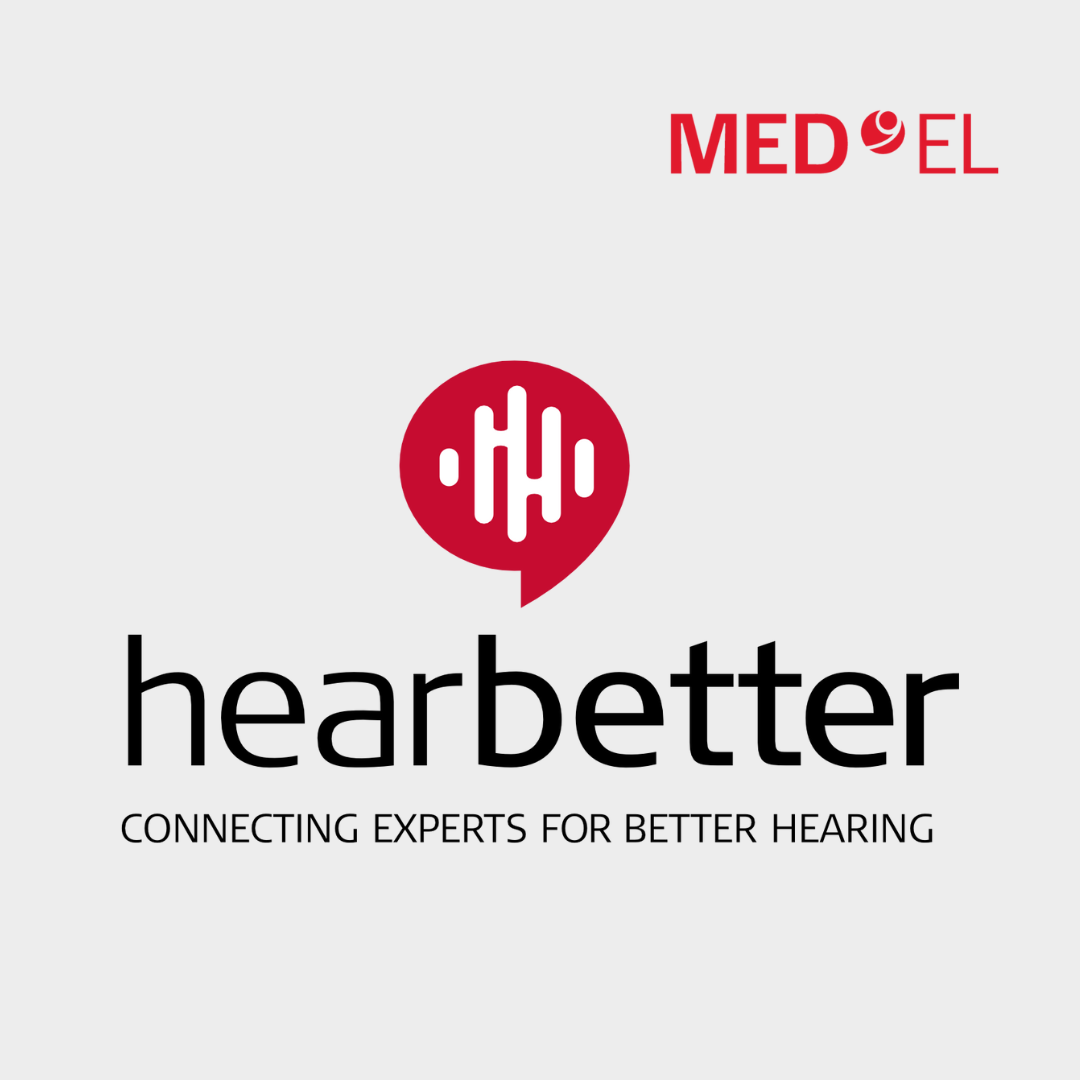
You can find more information on hearbetter and even become a community member.
June 2022
New HHFEU Position Papers to Raise Awareness Among Policymakers
The HHFEU has produced various position papers to further increase awareness about hearing loss, related comorbidities, the economic and societal impact, and the importance of early detection and treatment. The following papers are now available:
- Economic Impact of Hearing Loss
- Mental Health and Hearing Loss
- Importance of Hearing Screening
- Inclusive Approach to Europe’s Hearing Health Challenges
- Prioritising Hearing Care in Europe’s Ageing Population
All position papers summarize the most important hearing health facts and provide policy recommendations. Therefore, all papers can be used by policymakers to set national policy and to prioritise ear and hearing health on the European agenda.
You can find an overview of all topic papers linking to the respective PDFs in our resource section.
March 2022
New Campaign on Hearing Loss and Mental Health #ListenUp
A new campaign has been launched, created by the members of the Hearing Health Forum EU, together with EUFAMI, GAMIAN Europe, EUCOMS, and EFHOH to raise awareness of the relationship between hearing loss and mental health.
Infographics on the following topics have been created:
- Untreated hearing loss is a risk factor for mental ill-health;
- Untreated hearing loss and mental ill-health are linked to ageing;
- Alongside the WHO, participants call for immediate action to be undertaken;
- Hearing loss is under-treated in the EU;
- Untreated hearing loss and its comorbidities are costly to societies;
- A holistic approach to care is needed to tackle hearing loss.

You can read more on our LinkedIn page where we've shared the campaign's latest social media cards.
You might also be interested in our HHFEU topic paper on hearing loss and mental health.
October 2021
Joint Statement on Inclusive Education
In 2020, MED-EL launched a series of roundtables with MEP Ádám Kósa, the first deaf European politician user of Hungarian Sign Language at the European Parliament. The aim is to build a consortium around the cost of untreated hearg loss in Europe.
The theme of the latest roundtable in June 2021 was inclusive education for the deaf, hard of hearing and Cochlear Implant users in Europe.
Studies have found that hard of hearing children are more likely to have academic difficulties in mainstream schools and have poorer academic performances. Many children are enrolled in special schools which do not always offer effective bridges to the mainstream education system. Therefore, policy recommendations on inclusive education have been established during the roundtable.
You can read more about the Joint Statement and the Policy Recommendations.
April 2021
Hearing Care for All - Malta Introduces Hearing Screening for Adults
Malta is taking a proactive approach to tackle untreated hearing loss. Our HHFEU president, Maltese MEP Alex Agius Saliba, is leading a revolutionary new hearing screening programme for adults across Malta. The Hearing Care for All initiative aims to identify hearing problems as early as possible, while raising awareness for hearing loss.
You can read more information about Hearing Care for All and watch videos of Agius Saliba and Patrick D’Haese talking about this project.
You might also be interested in reading more about Europe's Ageing Society.
April 2021
New Hearing Loss and Cognition Campaign Launched
A new campaign created by the Hearing Health Forum EU members, Gamian Europe, and Alzheimer's Europe aims to raise awareness of the relationship between hearing loss and cognitive health.
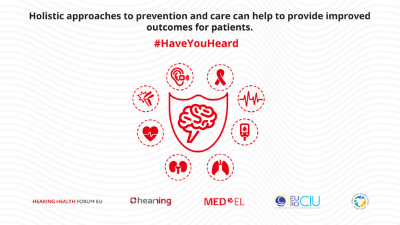
You can read more on our LinkedIn page where we've shared the campaign's latest social media cards. You might also be interested in learning more about hearing loss in adults on our website.
March 2021
World Report on Hearing Launched
The World Report on Hearing, created by the World Health Organization, sets clear recommendations to achieve hearing and ear care as part of universal health coverage.
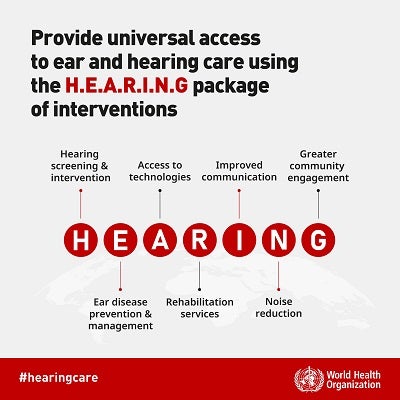
Read our synopsis of the report in our latest LinkedIn post
February 2021
New Statement of Intent on Ageing and Hearing Loss
"Ageing and hearing care sectors join forces to raise awareness of the link between hearing and healthy ageing, and the importance of improving access to hearing care for older adults."
International Federation on Ageing (IFA)
The Hearing Health Forum EU support the IFA's Statement of Intent, which aims to improve access to hearing care for adults:
- Increase awareness and tackle stigma
- Synthesize and disseminate knowledge to change practice in the context of healthy ageing
- Articulate economic advantages of hearing care and elevating hearing loss as a public health concern
- Promote equity and access to hearing care
- Apply evidence to guide actions
We've shared the full Statement of Intent on our LinkedIn page
November 2020
EU Cognitive Decline Workshop Recognises Hearing Loss as the Primary Modifiable Risk Factor of Dementia
An estimated 9.1 million people in Europe live with dementia. With this number expected to double by 2040 it poses a challenge for healthcare systems and policy makers in Brussels.
However, there are 12 modifiable risk factors of cognitive decline that can help to prevent the disease. Did you know that hearing loss is the number one modifiable risk factor? Because untreated hearing loss deprives the brain of stimulation from communication, it can increase the risk of dementia by as much as 8%.

In response the Hearing Health Forum EU (HHFEU) hosted the EU Cognitive Decline Workshop with leading cognitive health organizations to shape an awareness campaign.
Read more on our LinkedIn page where we post the latest HHFEU articles
October 2020
First European Surgery of Totally Implantable Cochlear Implant
In our bid to bring you the latest hearing loss news, we're excited to share that in September 2020, the first person in Europe received a novel totally implantable cochlear implant (TICI). Implanted by Prof. Dr. Philippe Lefebvre, it forms part of a feasibility study that could change the field of hearing implants for people with severe to profound hearing loss.

The TICI system, which is produced by MED-EL, places the internal and external components of a cochlear implant system in one device that is implanted underneath the skin.
“We tested the implant after surgery and are thrilled that everything is working as expected. Modern cochlear implant technology has been evolving at an impressive pace, delivering outstanding hearing results. The TICI is a milestone within the field of cochlear implantation. It has been a wish from the early days of cochlear implantation to be able to integrate all components within an internal device.”
Prof. Dr. Philippe Lefebvre
Several more surgeries with the device will follow in Liège and Munich as part of the clinical feasibility study. As a result, it will take several years before it receives full market approval and becomes more widely available.
September 2020
Landmark Consensus on the Treatment of Adult Hearing Loss with a Cochlear Implant
The first ever global consensus on the use of cochlear implants as the minimum standard of care for adults with bilateral severe and profound hearing loss has been published. The paper, authored by an independent panel of hearing experts, includes 20 consensus statements, covering seven core themes;
- Awareness of cochlear implants;
- Best practice clinical pathway for diagnosis;
- Best practice guidelines for surgery;
- Clinical effectiveness of cochlear implants;
- Factors associated with post-implantation outcomes;
- The relationship between hearing loss and depression, cognition and dementia; and
- Cost implications of cochlear implants.
Read the Key Points and Abstract or more about hearing loss in adults
“Initiatives like this will help us to tackle the silent burden of severe hearing loss, to prioritise hearing loss as a public health challenge and to raise awareness of the condition.”
Dr. techn. DDr. med. h.c. Ingeborg Hochmair, CEO, MED-EL
September 2020
Cochlear Implant Company Wins TRIGOS Award 2020

MED-EL, leading expert for hearing solutions, recently received Austria’s most prestigious award for corporate social responsibility. The TRIGOS Award from the Austrian Development Agency (ADA) recognised MED-EL’s healthcare project to improve hearing loss diagnosis and rehabilitation in Bangladesh and Côte d'Ivoire.


